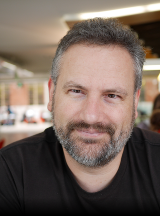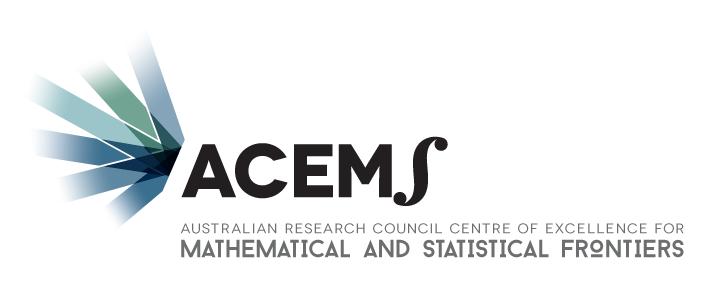The ACEMS Workshop on Challenges of Data and Control of Networks is broad-ranging workshop covering topics in measurement, management and control of networks. In particular, we want to consider networked cyber-physical systems, but other topics from wireless, WWW, and other network management settings will be considered.
Information
- Location: Level 7, Inkgarni Wardli Building, University of Adelaide, Australia
- Dates: 6-8 December, 2017
- Contact Info: Matthew Roughan, matthew.roughan@adelaide.edu.au
Program:
| Day | Time | |
|---|---|---|
| Wed | 5-6pm | Meet and Greet, Wine and beer on level 7 (Inkgarni Wardli) |
| Thur | 9.00-9.25 | Coffee |
| 9.25-9.30 | Welcome | |
| 9.30-10.30 | John Doyle, Universal laws and architectures in complex networks | |
| 10.30-11.00 | Morning Tea | |
| 11.00-12.00 | Nikolai Matni, System Level Synthesis for Internet-Scale Control | |
| 12.00-2.00 | Lunch | |
| 2.00-3.30 | Short talks and discussion | |
| Shaun Voigt, DST group | ||
| Sofia Silva Berenguer, APNIC | ||
| He Chen, Uni. of Sydney | ||
| Silvio Tarca, ACEMS and Uni. of Adelaide | ||
| 3.30-4.00 | Afternoon tea | |
| 4.00-5.00 | Paul Barford, Data is the new oil! (but winter is coming) | |
| 6.30 (for 7.00) | Dinner at The Wharf, The Marina Pier, 4 Holdfast Shores, Glenelg SA 5045 | |
| Fri | 9.30-10.30 | Walter Willinger, A different kind of SDN: Self-Driving Networking |
| bonus talk, On the Past, Present and Future of “Big (Internet) Data” | ||
| 10.30-11.00 | Morning tea | |
| 11.00-12.00 | Short talks, discussion and wrap up | |
| Dinesha Ranathunga, ACEMS and Uni. of Adelaide | ||
| Darryl Veitch, UTS, Trusted Timing & the Network Core | ||
| Matt Roughan, ACEMS and Uni. of Adelaide |
Keynote Speakers:
John C. Doyle, Caltech
Talk: Universal laws and architectures in complex networks
Effective layered architectures such as the brain seamlessly integrate high level goal and decision making and planning with fast lower level sensing, reflex, and action and facilitate learning, adaptation, augmentation (tools), and teamwork, while maintaining internal homeostasis despite the severe demands such actions can put on the whole body’s physiology, and despite being implemented in highly energy efficient hardware that has distributed, sparse, quantized, noisy, delayed, and saturating sensing, communications, computing, and actuation. Similar layering extends downward into the cellular level, and many aspects of this convergent evolution will increasingly dominate our most advanced technologies. Live demos using audience’s brains highlight universal laws and architectures and their relevance to future network technologies. We’ll briefly give pointers to a new unified mathematical framework that we hope will facilitate reverse engineering cells, brains, and societies and forward engineering future network architectures. Nikolai Matni will go further into the math details.
Bio: John Doyle is the Jean-Lou Chameau Professor of Control and Dynamical Systems at the California Institute of Technology. His research is on mathematical foundations for complex networks with applications in biology, technology, medicine, ecology, neuroscience, and multi-scale physics that integrates theory from control, computation, communication, optimization, statistics (e.g. Machine Learning); with emphasis on universal laws and architectures, robustness/efficiency and speed/accuracy tradeoffs, adaptability, and evolvability and large scale systems with sparse, saturating, delayed, quantized, uncertain sensing, communications, computing, and actuation. John’s work is widely acknowledged: he has won the IEEE Baker Prize, the IEEE Automatic Control Transactions Award (twice), the 1994 AACC American Control Conference Schuck Award, the IEEE Control Systems Field Award and many others. His work was included in Best Writing on Mathematics 2010, and his work was listed in the world top 10 “most important” papers in mathematics (1981-1993).
Walter Willinger, Chief Scientist, NIKSUN Inc.
Talk: A different kind of SDN: Self-Driving Networking
For at least a decade, networking researchers, equipment vendors, and Internet service providers alike have argued for “autonomous” or “self-managing” networks, where network management and control decisions are made in real time and without humans in the loop. Yet, building such “self-driving” networks that are practically deployable has largely remained unrealized. In fact, the design and implementation of self-driving networks has been recognized as one of the ”grand challenges” of networking research today.
This talk makes the case that because of recent technological advances and scientific innovations, the time has come to tackle this grand challenge problem and finally realize the promise of self-driving networks. These advances and innovations include fully programmable, protocol-independent data planes and languages for programming them and the emergence of scalable platforms for processing distributed streaming data while leveraging the latest (big) data analysis and Machine Learning (ML) tools and software. In particular, it is the coupling of the programmable control of software-defined networking (SDN) with the inference capabilities of ML that promises unprecedented opportunities for querying high-volume and high-velocity (distributed) streaming data at scale so as to feed the necessary information to the many different network management and control tasks that self-driving networks should perform automatically and autonomously.
Bio: Walter Willinger is Chief Scientist at NIKSUN, Inc., the world leader in real-time monitoring and cyber forensics solutions. Before joining NIKSUN, he worked at AT&T Labs-Research in Florham Park, NJ from 1996 to 2013 and at Bellcore Applied Research from 1986 to 1996. He received his Dipl. Math. from the ETH Zurich and his M.S. and Ph.D. in Operations Research and Industrial Engineering from Cornell University. He is a Fellow of ACM (2005), Fellow of IEEE (2005), AT&T Fellow (2007), and Fellow of SIAM (2009), co-recipient of the 1995 IEEE Communications Society W.R. Bennett Prize Paper Award and the 1996 IEEE W.R.G. Baker Prize Award, and co-recipient of the 2005 and 2016 ACM/SIGCOMM Test-of-Time Paper Awards. His paper “On the Self-Similar Nature of Ethernet Traffic” is featured in “The Best of the Best - Fifty Years of Communications and Networking Research,” a 2007 IEEE Communications Society book compiling the most outstanding papers published in the communications and networking field in the last half century.
Paul Barford, University of Wisconsin
Talk: Data is the new oil! (but winter is coming)
Recent articles in a variety of publications have hailed data as “the new oil”. This somewhat breathless statement recognizes that the digital economy is intrinsically dependent on data collected from users in the Internet. In the first part of this talk, I will describe mechanisms for data collection that are commonly employed and how this data is monetized in the market place. While there continue to be opportunities in this ecosystem, it is dominated by the “walled gardens” such as Amazon, Google and Facebook, whose practices are increasingly scrutinized. In the second part of this talk, I will discuss the risks that the digital economy is facing. In particular, there are growing concerns - primarily outside of the US - about user data privacy, and the specter of regulations such as the EU’s General Data Protection Regulation (GDPR) represent a significant threat to certain standard practices in the ecosystem.
Bio: Paul Barford is a Professor in the Computer Science Department at the University of Wisconsin - Madison. He is also the Chief Scientist at comScore, Inc., a world-wide media measurement company. His research interests are Internet measurement and Security. He is the founder of two successful Internet startup companies. He has published over 100 papers in forums such as the ACM Internet Measurement Conference and the ACM SIGCOMM Conference. He is an ACM Fellow, has a number of award winning papers and his Internet Atlas project was named one of the 100 Greatest Innovations of 2017 by Popular Science Magazine. His hobby is taking naps.
Nikolai Matni, Berkeley
Talk: System Level Synthesis for Internet-Scale Control
The first half of this talk poses and solves an in-network congestion management problem, wherein a software-defined network is used to implement a distributed optimal controller designed to mitigate the effects of in-network congestion caused by rapid variations in traffic demand. In particular, we propose using High Frequency Traffic Control (HFTraC) algorithms that exchange real-time flow rate and buffer occupancy information between routers to dynamically coordinate their link-service rates. We show that the design of such dynamic link-service rate policies can be cast as a distributed optimal control problem that allows us to systematically explore an enlarged design space of in-network congestion management algorithms. We end this part of the talk with a description of our experimental validation of these algorithms on a custom experimental testbed, a Mininet emulation of a backbone network and a production WAN. The second half of the talk introduces the System Level Approach to controller synthesis, a novel framework for distributed optimal control that allows for the previously described methodologies to be applied at Internet scales. Through the use of illustrative case studies, we show how shifting from controller to system level synthesis allows for tremendous advantages in scalability: central to these developments is the concept of localized system responses and controllers. No prior knowledge of control theory will be assumed, and the talk will aim to be tutorial in nature and entirely self-contained.
Bio: Nikolai is a postdoctoral scholar in EECS at UC Berkeley. Prior to that, he was a postdoctoral scholar in Computing and Mathematical Sciences at the California Institute of Technology. He received the B.A.Sc. and M.A.Sc. in Electrical Engineering from the University of British Columbia, and the Ph.D. in Control and Dynamical Systems from the California Institute of Technology in June 2016. His research interests broadly encompass the use of learning, layering, dynamics, control and optimization in the design and analysis of complex cyber-physical systems. He was awarded the IEEE CDC 2013 Best Student Paper Award, the IEEE ACC 2017 Best Student Paper Award (as co-advisor) and was an Everhart Lecture Series speaker at Caltech.
Registration
Registration is open. Please go to the registration page.
Workshop numbers will be strictly limited with preference given on a first come basis.
Costs:
| Type | Cost |
|---|---|
| ACEMS Student | $0 |
| External Student | $50 |
| ACEMS Member | $100 |
| External | $250 |
Local Arrangements
Possible accommodation locations close to the University are
But there are several others nearby.
Sponsorship
- ACEMS
- University of Adelaide


